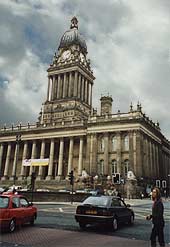| home
||| superimposed city tours ||| research: leeds |||
|
Psychogeographical mapping of coincidence in Leeds and Dortmund. Drifting through superimposed narratives of two cities at once.
|

|
||| leeds town hall |||
The Town Hall had an air raid shelter and a British Restaurant in the cellar during the war. British Restaurants existed in cities across Britain, and were an attempt to ensure the provision of wholesome meals for the populace. Leeds British Restaurant may have been open 24 hours during the war, though I haven't found confirmation of this. It closed in 1966, though is reportedly still physically existant, now used for storage.
Just before midnight the Luftwaffe arrived and scattered explosives and
incendiaries across the city. There was considerable panic as 4,600 houses,
the museum
and Town Hall were damaged. Casualty figures
were often obscured in wartime to deny the Germans propaganda material
but post-war records suggest 65 people were killed that night and 260
injured, 56 of them seriously.
http://www.applied-technologies.co.uk/ljcc2002/cityofleeds.htm
The worst raid was on 14 March 1941, when shortly before midnight high
explosives and incendiaries were showered over the city. The telephone
system was put out of action immediately, the waterworks and gas supplies
were affected... some damage to the City
Museum and the Town Hall, 4600
houses damaged (100 of them beyond repair) and 65 or 64 dead, 56 or 57
seriously [injured] and 202 or 203 slightly wounded.
Owen A. Hartley, 'The Second World War and after' in Derek Fraser (ed), A History of Modern Leeds, P443
A bomb damaged the Town Hall (shortly before
its clock struck midnight on 14 March 1941) and the City
Museum. Those who passed the smouldering museum after the raid
recalled a scattering of mounted butterflies from the collections. A dug-out
boat that to life when Giggleswick Tarn was drained was blown into aqbout
45 pieces (later to be painstakingly reassembled for exhibition in a special
case with art-work to evoke the original setting).
W.R. Mitchell, A History of Leeds, P143
The part of the Town
Hall that was directly hit was the Judges Chambers.
Documentary film, Leeds At War
The wartime Prime Minister, Winston Churchill, arrived unexpectedly in
Leeds that morning and spent three hours talking with local officials
but found time to deliver an unprepared speech to 20,000 from the steps
of Leeds Town Hall. Later, Churchill (waving
the ubiquitous cigar) and his wife were driven round the streets in an
open car.
http://www.applied-technologies.co.uk/ljcc2002/cityofleeds.htm
|
||| offsite: articles |||
|

||| Town Hall, 09/02 ||| |
|
